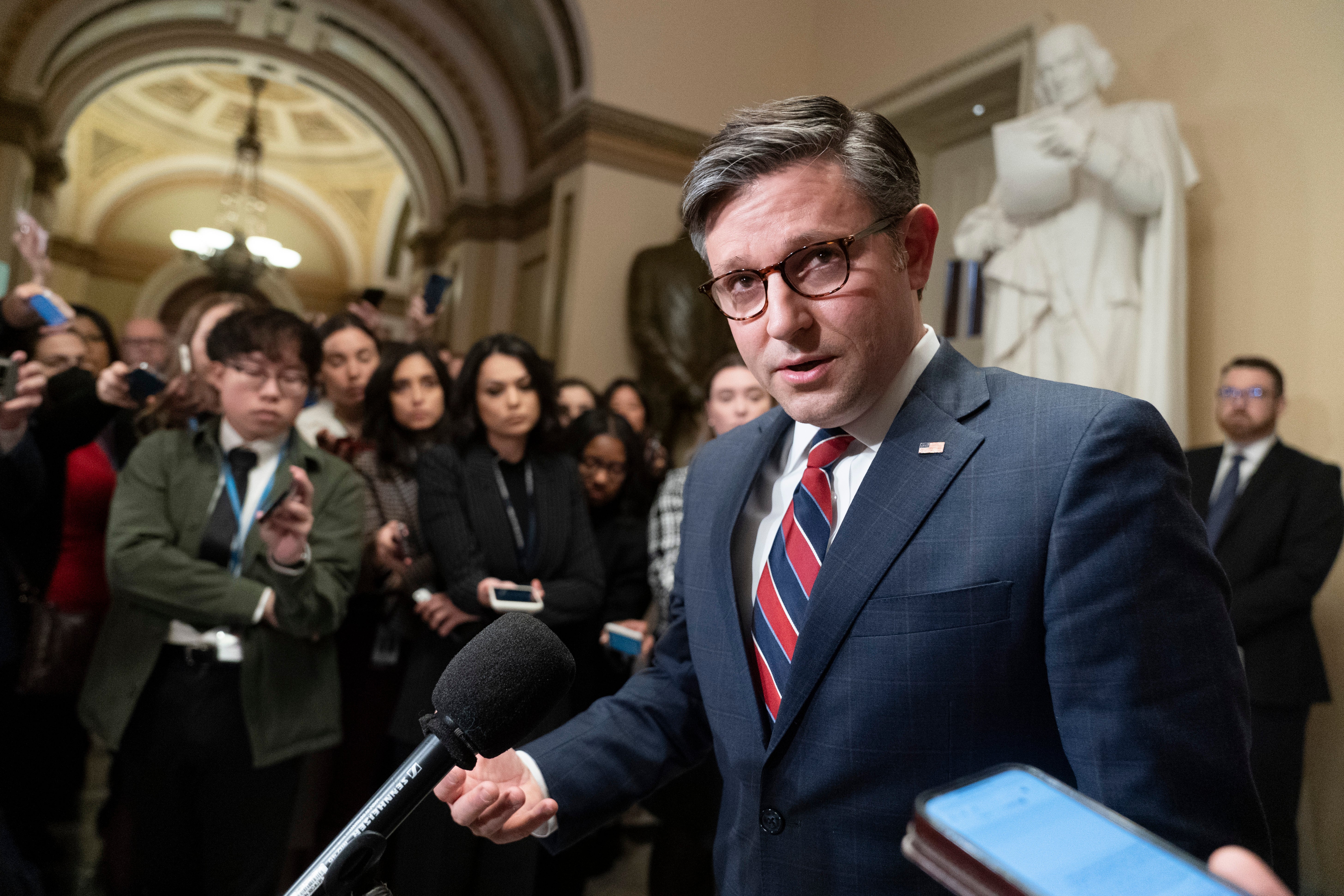Speaker Mike Johnson reaches deal with Chuck Schumer for long-term spending bill
Congressional leaders could avert shutdown threats with deal for 2024 fiscal year

House Republican leadership and their counterparts among the Democratic Senate majority are set to announce a topline deal on spending for the next fiscal year, ending a pattern of short-term funding measures that had threatened government shutdowns.
The deal, which Speaker of the House Mike Johnson and Senate Majority Leader Chuck Schumer reached on Sunday, will supposedly include roughly $16b in cuts to nondefence spending while also providing for a pay increase for service members.
Axios first broke news of the topline number, which is set at $1.59tn for the full package. If legislation to fund the government at this level passes before funding deadlines over the next month and a half, it will represent a major victory for the burgeoning speakership of Mr Johnson, who will have achieved what his predecessor Kevin McCarthy could not: Keeping his caucus unified while passing a long-term government funding bill.
Previous reporting from The Washington Post in December indicated that the House Freedom Caucus, the far-right contingent in the House of Representatives, had signed on to the $1.59tn topline number. That in itself was a significant coup for Mr Johnson, who had successfully talked the group back from its original target of $1.47tn.
The topline means that the funding levels put in place by the Fiscal Responsibility Act (FRA) last May, legislation championed by the White House and congressional Democratic leaders, will remain intact. Cuts to government spending are expected to include some Covid relief and IRS funding.
President Joe Biden issued a statement from Delaware, where he was staying for the weekend, applauding congressional leaders for not dragging the US through another shutdown battle.
“The bipartisan funding framework congressional leaders have reached moves us one step closer to preventing a needless government shutdown and protecting important national priorities,” said Mr Biden. “I want to thank Leaders Schumer and Jeffries for their leadership in reaching this framework. Now, congressional Republicans must do their job, stop threatening to shut down the government, and fulfill their basic responsibility to fund critical domestic and national security priorities, including my supplemental request. It’s time for them to act.”
It’s no secret that Mr Johnson, however, is playing under markedly different circumstances than was Mr McCarthy. The former speaker, who lasted less than a year in the job and eventually resigned in utter defeat (after vowing not to) at the end of the year, was ousted over the summer in what began a whirlwind of chaos in the lower chamber. Republicans were accused of throwing the federal government into a complete standstill with infighting after a cadre of conservatives unhappy with Mr McCarthy successfully led a motion to oust him which ended up being supported by every Democrat in the chamber. As it turned out, Republicans did not have the votes to quickly elect a new speaker, and a succession of GOP candidates rose and fell before Mr Johnson was finally picked as a compromise.
Democrats, in a joint statement, warned Mr Johnson and Republicans on Sunday against attempts to sabotage the deal in the days ahead.
“The bipartisan topline appropriations agreement clears the way for Congress to act over the next few weeks in order to maintain important funding priorities for the American people and avoid a government shutdown. The framework agreement to proceed will enable the appropriators to address many of the major challenges America faces at home and abroad,” said Mr Schumer and House Minority Leader Hakeem Jeffries.
“Finally, we have made clear to Speaker Mike Johnson that Democrats will not support including poison pill policy changes in any of the twelve appropriations bills put before the Congress.”
Mr Johnson has yet to issue a public statement on the funding deal.
The political fallout from Mr McCarthy’s ouster was immense; Republicans were once again labelled the party of obstruction and unwillingness to govern by their detractors and found many of their own publicly agreeing with that conclusion.
If Mr Johnson has successfully wrangled his party’s far-right wing, it is likely a sign of their own fatigue as much as it is an acknowledgement of his negotiation prowess. With the departure of both Mr McCarthy and his top ally, Patrick McHenry, the House Republican majority is thinner than ever. A funding bill with the support of leadership in both parties will almost certainly pass, but the path remains almost impossibly narrow for the GOP to pass significant legislation without Democrats through the lower chamber going forward.
Join our commenting forum
Join thought-provoking conversations, follow other Independent readers and see their replies
Comments
Bookmark popover
Removed from bookmarks